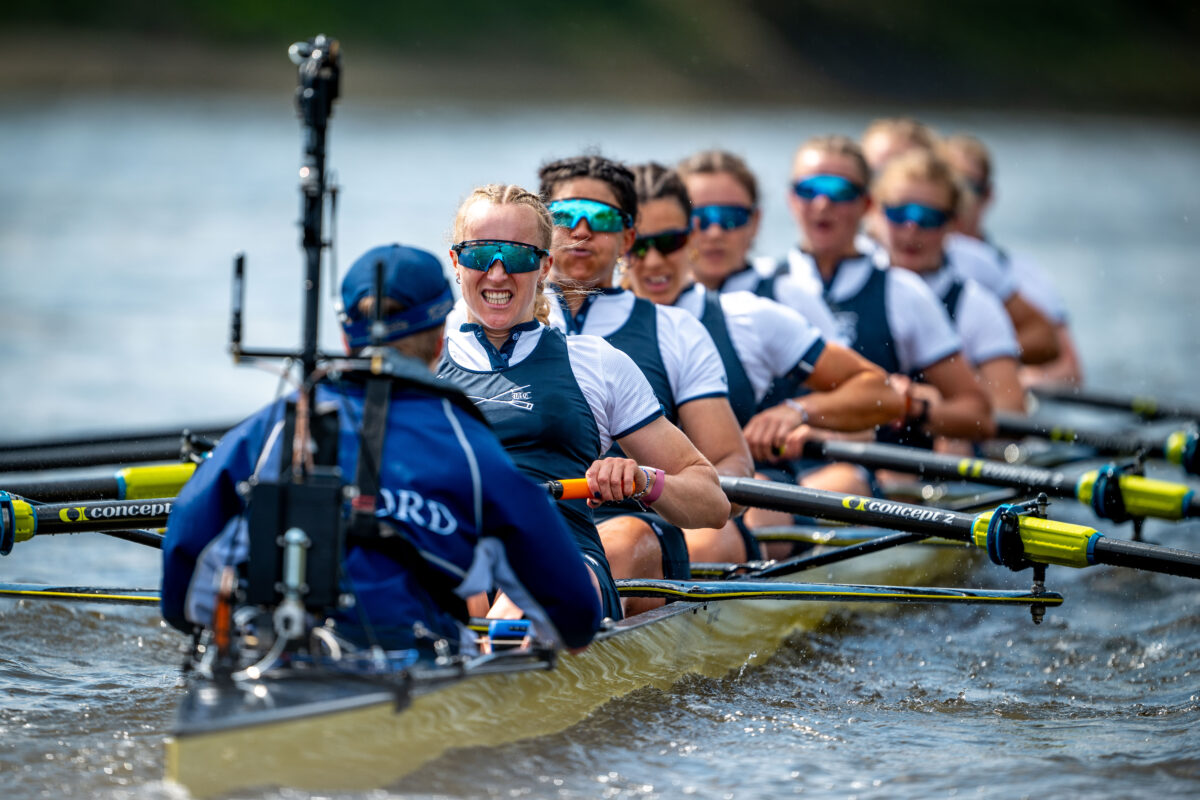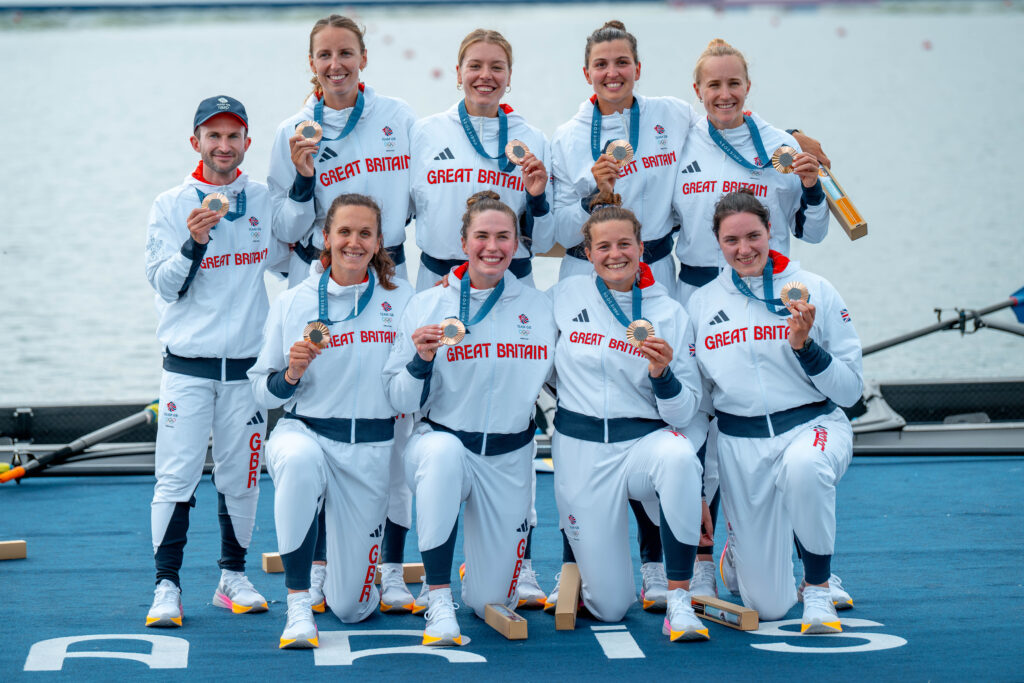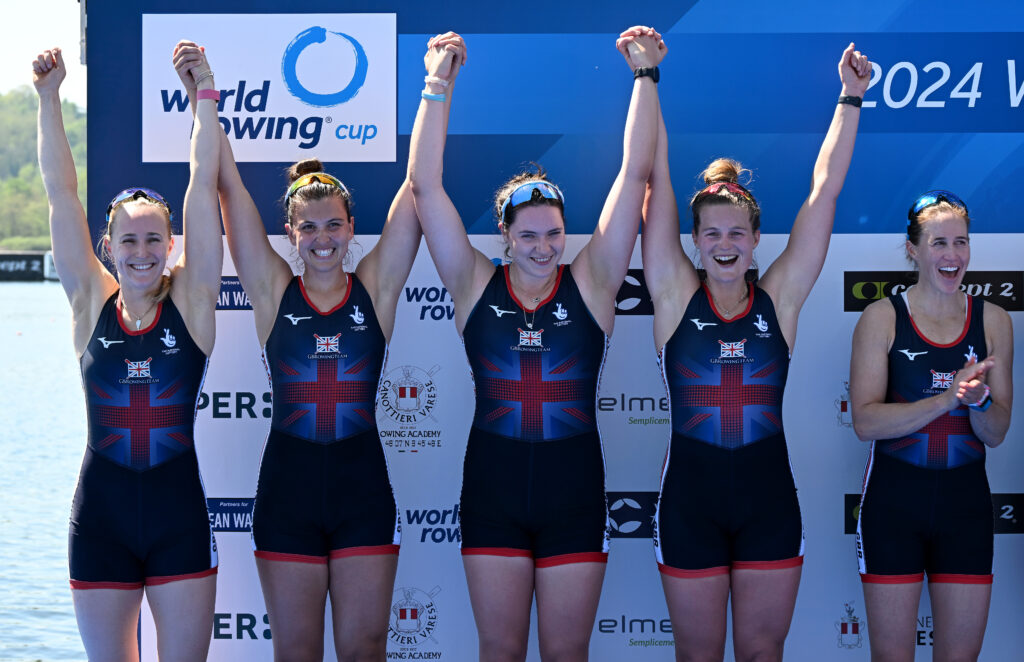
23 Apr 2025
April 2025: Heidi Long
ROWER OF THE MONTH – Britain’s Heidi Long is a former World Champion and Olympic bronze medallist, and she has spent this season rowing for Oxford University Boat Club, stroking their women’s Blue Boat in the 2025 Boat Race. She is the Rower of the Month.
How did you get into Rowing?
I signed up at school to every sport that was offered. Once a week we’d go down and row at Dorney Lake. It wasn’t exactly like the rowing I know now, we’d play around on rowing machines a bit and sometimes go out in bell boats and once in a while in rowing boats, but it was my first taste of Rowing.
Then I was on a walk in Marlow with my family and I saw the junior development programme and went along and had a chat; after a trial run I joined their junior development squad and the rest is history from there.
I was hooked from day one. I loved the teamwork side of it, that you’re all in the same boat.
What has Rowing brought you over the years?
Fundamentally it has really helped me as a person from a confidence perspective; being part of a team and having something that you’re passionate and purposeful about. I went from being a girl at school who found it hard to talk in front of other people and was often very anxious before going to school, to loving school. It could have been down to so many things, but being part of Rowing and being part of a sport that I shared with other people was a huge part of that.
And then other than that, the friends that I’m going to have for the rest of my life. The people are incredible and the relationships you make with them from sharing so many different experiences and hard times and good times.
It’s enabled me to travel around the world, to go to the States for university, to come to university at Oxford to do a masters. It’s just opened a world of opportunities for me.
What was the Paris 2024 Olympic campaign like for you?
I remember one of our first conversations we had as a crew, it was “what do we want to get out of this project?” It was clear from the whole room that everyone wanted to go out and win the Olympic gold medal, that wasn’t even questioned from day one.
We definitely didn’t start off with that boat speed, it wasn’t like we were coming in as favourites, or had won any races in the lead-up to it. We knew it was a huge challenge to do it, but we came together really well as a crew. Everyone just got on really really well and was very driven every day to get the boat coming together as fast as we could.

Over the World Cups and the Europeans we’d been beaten by different countries. We were always in the medals and always in the mix, but were never the top dogs, but we were finding more speed and were ahead for longer and longer down the course as we went along. From day one we went out to go as hard as we could from the first stroke for the first 500 metres and then hold on. Everyone committed to that from the first day in the project. So on the night before the Olympics when our coach said “you’ve just got to go as hard as you can from stroke one”, we knew we could, because that’s what we’d done day in day out for the six months before that.
It was a fantastic project to be a part of. I absolutely loved the people and the journey. I remember seeing my mum shortly after we won the bronze medal and she was pretty nervous because she thought I was going to be upset because we didn’t win gold, but I couldn’t have been happier. It wasn’t relief or sadness on that podium, it was just true happiness.
What made you decide to apply for Oxford?
I actually first applied for Oxford when I was applying to be an undergraduate back in 2014. It’s always had a huge appeal to me. There’s the rowing side of it, but also to be part of such an inspiring institution in the UK, have a bit of that British university life.
The people and the community here has surpassed my expectations, being in a city where there’s so much going on. Every single conversation takes you down a completely different route, you’re meeting people from all different areas of expertise. Being part of that has been really really special.
I’ve always dreamed of taking part in the Boat Race. I watched it when I was younger, and so to be part of that campaign I just wanted to give it another shot, to put an application in and see if I could make those dreams come true.
How different was rowing for Oxford compared to rowing at the University of Virginia or for Great Britain?
The first primary difference is you have such a broad range of experience at Oxford. You’ve got rowers who’ve learned to row at their college a few years before, mixed with people who’ve been racing for 10-plus years and gone to the Olympics, so there’s a huge range of experience and understanding of rowing.
Trying to bring that together with one goal can be seen as really challenging. But the coaches and the team at Oxford have done it so well that it doesn’t seem like a challenge, it seems like a pure opportunity. People can learn from each other and it’s given me a perspective on rowing that I haven’t had before. It is all about bringing women and people together to generate something exciting that they can be proud of and passionate about for the rest of their life.
Having to balance academics and sport is never that easy. It’s very extreme at Oxford because you’ve got such high academic pressure. Equally everyone is on it with their time management and their organisation, and you can just do it as a team. You can really fall back and ask for help and rely on other teammates. People will go and study together in the libraries after training sessions, help each other stay accountable, people will be working on the minibuses, trying to find all those minor amounts of time that add up over a longer period.
The other obvious one is that it’s a completely different race You’re preparing for a 6.8k gladiatorial battle down a river which has bends and bridges and waves and clashes and all sorts going on, rather than you’re sat in your lane, nobody else can affect you and you’re just going as fast as you can from A to B. It is a very different race and something I did not appreciate until being part of the programme.
What did it feel like to be in the Boat Race?
I thought we could win it all the way to the very last stroke. I think that’s testament to the belief that we’ve tried to build in each other throughout the last year, and testament to Daniel our cox’s coxing. I honestly thought we could still win it until we crossed the line and heard ‘down’.
When I look back at it, in reality there wasn’t a chance that we were going to win it after a certain point, but I really firmly believed it. That belief deep down means that you just don’t stop. You’re so in tune with the other people in the boat and have worked on something so intensely and care about them all so much that no matter what happens you’d just keep giving your absolute best every single stroke all the way down the course until the flag drops.
Everything was to try and win it, but one of our main goals was to create a project that we’re really proud of and hopefully by doing that we’d have enough boat speed to win the Boat Race. There wasn’t a single stroke that anyone let up on.
It’s about driving a commitment that you really believe in and being gritty and having that pack mentality that you can work together, I hope that’s what resonates with the people who watched it, that we were gritty racers.
You’re studying the impact of ultra-processed food on fertility – what got you interested in that topic and why is it important?
When I was at British Rowing there was Project Minerva which was looking at elite training and women’s health. I got involved in a couple of projects they did there which involved tracking our training load and how our body responds to different things, and our hormones. Getting involved in that project and learning a lot more about women’s health highlighted to me how much of our environment and what we do to our bodies can not necessarily impact us in the healthiest way.
I’ve always been really passionate about food about cooking and eating food. When my dad was diagnosed with cancer we looked a bit at diet and how it would impact him and change his prognosis. It was something I started to read about a lot more.
It is still early days in research; there’s so much more that we need to know. How is this ultra-processed food affecting our bodies? Is it because of the chemicals that are added, is it because of the processing that goes on, is it because of the way it’s created that we consume more, or is it because of the nutritional compounds? There were so many questions that I had, so to have the opportunity to go out and research it, this couldn’t be better. The reason that I’ve chosen ultra-processed foods and female fertility is because it links both those sides that I’m really passionate about.
It is really interesting and it’s been a huge learning curve but the more I’ve stuck my teeth into it the more I want to find out. I gave up ultra-processed food for a month just to see what would be possible. It is possible, but it’s time-consuming and socially really hard going out for dinners with friends, or going out for food. It is hard not to consume ultra-processed food completely and I found that a really eye-opening experience.
What’s next in terms of rowing for you?
My intention with Rowing is to try and make the Olympic squad in LA 2028 and try and win an Olympic gold medal there. Exactly what that pathway looks like I don’t know but at the moment I’m back trialling and trying to get back into the squad.
I would love to take part in bumps, I’ve spoken to my college boat club a couple of times, it would be awesome to get involved in that as well.
Where’s your favourite place to row?

Varese, just because I’ve had some really awesome rowing experiences there. It’s really beautiful and often boats are going quite fast by that point in the season.
What’s your favourite session?
Probably eight 250s on the water. I would be excited when I saw that on the programme.
What’s on the erg playlist?
Electronic dance music; dance music generally; or the Oxford University Boat Club women’s playlist. It’s fantastic, a lot of Defying Gravity in there.
What’s the best piece of advice anyone’s given you?
The best piece of advice I got was when I was really just starting out rowing, and one of my friend’s dads said: “The day you’re not nervous is the day you need to quit.”
I didn’t really understand it for quite a long time and then I was having a conversation with someone else and the penny dropped that the reason you’re nervous is because you’re passionate about something. The day that that goes, it’s time to move on.
So it gives me a lot of confidence now when I’m sat on a start line and I’m nervous because these nerves are good. This means I care about something, this means I love what I’m doing. It’s awesome to have those feelings.
What else would you add?
I’d just say thank you to my friends, my family and all the coaches and teammates I’ve had along the way. I’ve pretty much swept for most of my career, so that always needs at least one other person, but I would not be the person or the rower I am today without all of them.

